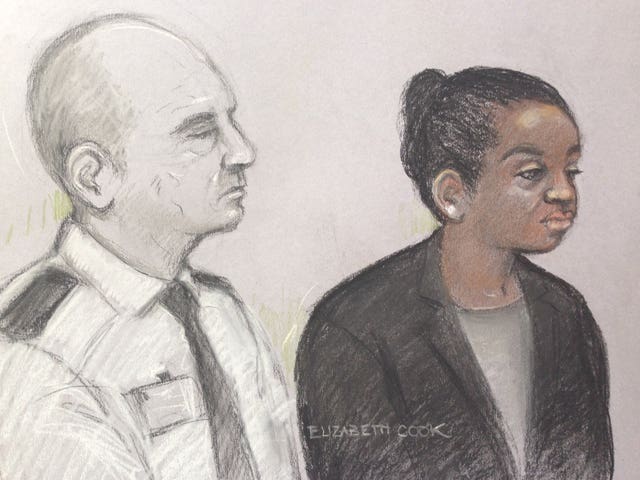
The ex-wife of former Liberian president Charles Taylor will walk free from custody after a senior judge dismissed torture charges against her.
University lecturer Agnes Taylor, 54, was charged in 2017 with a string of offences alleged to have taken place in 1990 during the West African country’s civil war.
She denied wrongdoing and was due to stand trial in January next year, but following legal argument, Mr Justice Sweeney dismissed all the charges and the prosecution indicated they would not appeal.
Ms Taylor, wearing a green jumper and pearl necklace, appeared at the Old Bailey on Friday via video link from Bronzefield women’s prison to hear the ruling .
Previously the Old Bailey heard one count related to the alleged torture of a pastor’s wife by tying her up and her witnessing the shooting of her two children.
A further three of the seven torture charges related to “severe pain or suffering” allegedly inflicted on a 13-year-old boy.
A conspiracy to torture charge related to allegations of rapes by National Patriotic Front of Liberia forces in a village.
Ms Taylor, from Dagenham, east London, previously worked as a senior lecturer at Coventry University.
She had been accused of committing the crimes while serving as a public official or acting in an official capacity.
Charles Taylor was Liberia’s president from 1997 to 2003. Up to 250,000 people are believed to have been killed during civil conflict between 1989 and 2003.

Handing down his ruling, which was not read in court during the 10-minute hearing, the judge said Ms Taylor could not be charged with torture as a crime against humanity or a war crime because the alleged offences took place in 1990 – before the relevant sections of the International Criminal Court Act were introduced in 1991.
Ms Taylor left Liberia in 1992 and divorced her husband in 1996, before the end of the civil war. She has not left the UK since 2001, the court previously heard.
Prosecutors argued that she was acting in a de facto official capacity on behalf of armed group the National Patriotic Front of Liberia (NPFL), said to have been formed by Charles Taylor and responsible for attacks on President Samuel Doe during the civil war.
In her defence case statement following her arrest in 2017, Ms Taylor said that at no time did she act in an official capacity for the NPFL and disputed that the NPFL was the de facto governmental authority in the relevant areas at the relevant times.
Ms Taylor is said to have had no contact with the former dictator following his conviction for aiding and abetting the commission of war crimes, for which he was sentenced to 50 years in jail. He is currently serving that sentence in the UK.
Ms Taylor applied for indefinite leave to remain in the UK in 2013, which was turned down in 2016 on the basis that there were concerns she may have committed a war crime.
An immigration judge will now be asked to rule on her immigration status, meaning she could be allowed to continue living in the UK where she has family, including two sisters and a jazz musician brother.
Previous court hearings were told that Ms Taylor was deemed to be a flight risk after her arrest when it was discovered she had two passports in different names and dates of birth.
The judge’s ruling said it was a core requirement for such a prosecution that the “organisation or body on behalf of which a person acts” carries out “functions normally exercised by governments over their civilian populations”, and that it needs to be distinguished from “purely military activity”.
He said: “What is needed in this case … is to look at the reality of the situation and to consider whether there is sufficient evidence that, at the time of each alleged offence, the NPFL had a sufficient degree of organisation and actual control over the relevant area, and whether it exercised the type of official or quasi-official functions or powers which a government or governmental organisation would exercise.”
The judge rejected the prosecution’s argument that evidence the NPFL rounded up, detained, tortured and killed civilians was evidence that the group was carrying out those functions of government over its population.
He said: “It is evidence of crimes contrary to international humanitarian law by those involved, which are crimes with which the defendant cannot be charged in this country.”


Comments: Our rules
We want our comments to be a lively and valuable part of our community - a place where readers can debate and engage with the most important local issues. The ability to comment on our stories is a privilege, not a right, however, and that privilege may be withdrawn if it is abused or misused.
Please report any comments that break our rules.
Read the rules hereComments are closed on this article